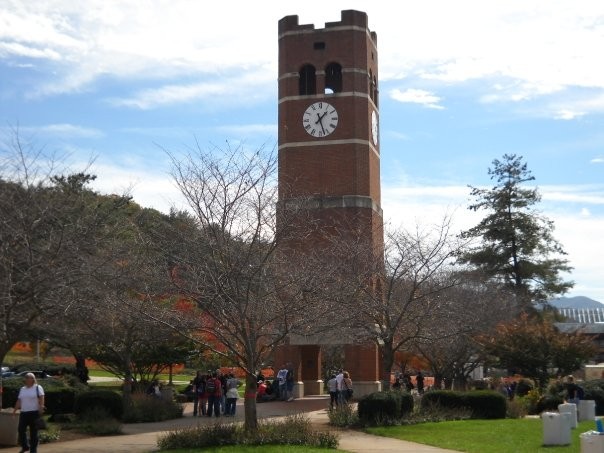While Asheville and Buncombe County K-12 schools are planning to start the academic year with heavy reliance on remote learning due to COVID-19, the area’s colleges and universities are taking a more aggressive approach in returning to campus. Western North Carolina’s higher learning institutions are bringing back students from across the state and around the country.
UNC–Asheville began a phased move-in process for students living on campus on July 17; students will have until Sunday, Aug. 9, to return to campus before classes begin on Monday, Aug. 10. While the first day of classes at Western Carolina University is scheduled for Monday, Aug. 17, students living on campus began moving back to campus on Aug. 1. Both institutions will use a combination of in-person, online and hybrid instruction.
Private institutions, including Warren Wilson, Montreat and Brevard colleges, will also return to campus this month with a mix of in-person, online and hybrid classes, as will community colleges such as A-B Tech and Blue Ridge Community College.
The Buncombe County Department of Health and Human Services has been in conversations with the Washington, D.C.-based Institute for Higher Education Policy and local academic leaders about college and university reopenings, said Dr. Jennifer Mullendore, Buncombe’s interim health director, at a July 30 press conference. State officials are also working to ensure student safety: The N.C. Department of Health and Human Services released COVID-19 guidance for institutions of higher education, as has the N.C. Community Colleges system, which includes A-B Tech, and the UNC System, which includes UNCA and WCU. All recommend social distancing when possible, requiring face coverings and promoting additional hand washing.
Although out-of-state students may bring further infection to the area, Mullendore said, she explained that she was less concerned about their impact because Buncombe County already has widespread community transmission. Buncombe has reported 1,715 cases of COVID-19 as of Aug. 3, according to NCDHHS.
“The colleges have put into place protocols to screen students and to identify them quickly to get them the testing and care they need,” Mullendore said. “I feel that it’s actually a pretty controlled environment. And we have good relationships with them and they know to pick up the phone and call us, should they need us.”
Cooper calls for federal unemployment assistance
Things just got more difficult for the roughly 1.2 million North Carolinians who have applied for unemployment benefits since the start of the coronavirus pandemic in March. The $600 weekly unemployment supplement provided by the federal COVID-19 relief package ended on July 31, and Congress remains divided on additional financial support.
At a July 28 press conference, Gov. Roy Cooper urged North Carolina’s congressional delegation to “put politics aside” and reach a deal that would help state residents. Without federal pandemic unemployment compensation, the maximum weekly benefit amount for those unemployed in North Carolina is $350, according to the N.C. Department of Commerce.
White House Chief of Staff Mark Meadows, who formerly served as WNC’s House representative, spent the last week in conversations with top Washington officials over a potential deal, according to reporting by the Washington Post. Republican lawmakers are now considering payments at 70% wage replacement; Democrats are calling for a continuation of the $600 weekly supplements.
In other news
- The Brevard Music Center, in partnership with the Pisgah Health Foundation, will offer free COVID-19 testing to all community members starting Wednesday, Aug. 5. Drive-thru testing will be available every Wednesday and Thursday, 8-11 a.m.
- The Blue Ridge Humane Society will hold a free pet food giveaway on Monday, Aug. 10, for anyone impacted by COVID-19. Supplies will be distributed at the Blue Ridge Humane Society Adoption Center in Hendersonville from 9 a.m.–1 p.m., or while supplies last.
- The Asheville Fire Department has sent a team of eight firefighters to Kinston, N.C., to assist with emergency support associated with tropical storm Isaias. The storm is expected to make landfall along the North Carolina coast overnight.




Although out-of-state students may bring further infection to the area, Mullendore said, she explained that she was less concerned about their impact because Buncombe County already has widespread community transmission.
As a local, let me say ‘Gee, thanks for your concern.’